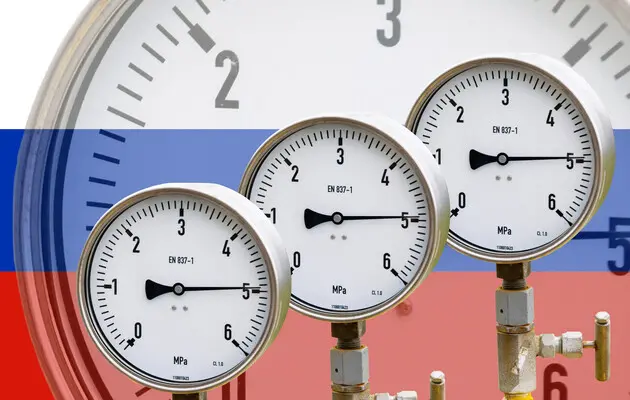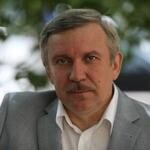Russian Gas for Europe: Reincarnation of the Corrupt "RosUkrEnergo"?
Recently, the President of Ukraine and people from his entourage have increasingly expressed their willingness to negotiate with the aggressor. At the same time, the topic of gas transit through Ukraine is getting louder and louder in the media space. If you think that these are two parallel processes, then you are wrong. In non-Euclidean geometry, parallel lines intersect. In our case, someone wants to cross these lines at a point called "gas corruption".
An excursion into history
If anyone celebrated the 20th anniversary of the Yalta meeting of the presidents of Ukraine and Russia, it was the "Prisoner of Vienna" Dmytro Firtash. It was then, on July 26, 2004, that Leonid Kuchma and Vladimir Putin agreed on the issue of regulating the supply and transit of natural gas and announced to the business representatives present the establishment of the company "RosUkrEnergo" (RUE), which will solve all the problems of bilateral relations in the gas sector. And already on July 29, a package of contracts was signed, designed for a 25-year period – until 2028, and a corresponding coordination board of the specified company was created in the Swiss canton of Zug. (At one time, "Mirror of the Week" disclosed all schemes and documents of RUE.)
But not only the elegant Swiss scheme was created in Yalta. As the mass media reported at the time, the provision on Ukraine's accession to the North Atlantic Treaty Organization (NATO) and the European Union as the ultimate goal of Euro-Atlantic and European integration was excluded from the "Military Doctrine of Ukraine".
What happened next, after Yalta, I suppose many still remember, was the Orange Revolution, which blocked the political drift of Ukraine towards the Russian Federation, preventing the establishment of a pro-Moscow regime in Kyiv. However, it did not prevent the gas scheme, which Russia took advantage of: through the RosUkrEnergo (RUE) scheme, the country's gas market was practically seized, gas prices were promoted for the National joint-stock company "Naftogaz of Ukraine" in 2006 and 2009. They were directed against Ukraine and the European Union. In the future, the Russian Federation, using and shaking up the political confrontation in Ukraine with "cheap gas", despite the replacement of the RosUkrEnergo (RUE) scheme with a bilateral contract with binding conditions for the Ukrainian company, caused political turbulence in our country. And this eventually brought to power a pro-Moscow regime of regionalists with a puppet group of Firtash and Boyko at the core. Then there were the Kharkiv agreements, the non-aligned status, the loss to the National joint-stock company "Naftogaz of Ukraine" to RosUkrEnergo (RUE) in the Stockholm arbitration, the refusal of the ruling group of regionalists led by Viktor Yanukovych from European integration, and the logical consequence — the Revolution of Dignity. It brought down the pro-Moscow puppet regime of the heads of gas flows, and Russia's aggression against Ukraine in 2014.
All new things are well-forgotten old things
The corrupt gas scheme, initiated and implemented according to the methods of the Committee for State Security (KGB) and the Federal Security Service of the Russian Federation (FSB), worked brilliantly 20 years ago, although it did not survive the allotted term of a quarter of a century. One can, of course, note that it was in those times when the Ukrainian economy used Russian gas for its needs for about three quarters, and now the situation is radically different, namely, only domestically produced gas is used, which 100% satisfies the country's needs. There is no such dependence that existed, it was overcome back in 2015, when the last cubic meter of blue fuel was imported from the public joint-stock company "Gazprom" on November 25. There is only a small volume of gas transit from the "Gazprom" public joint-stock company under the 2019 agreement, which is coming to the end of this year, and it will not be extended.
Public joint-stock company "Gazprom" is now not the same "Gazprom" that was full of gas profits with generous dividend payments and the Swiss practice of elegant corruption through bearer shares. The Russian "national property" is now unprofitable, is in an extremely problematic financial condition, which is getting worse, even according to the crooked data of official statistics. Public joint-stock company "Gazprom" has practically lost the European Union market, it is not doing as well as it would like with China. In addition, Central Asia does not want large volumes of Russian gas, Turkish hooligans have an unheard-of impudence, demanding ever greater discounts. But we should not forget that the general manager of Russian companies sits in the Kremlin and continues to act according to the methodology of the Federal Security Service of the Russian Federation (FSB). He can't do it any other way, as they say, only the grave can fix a hunchback.
Of course, a pure remake of "RosUkrEnergo" (RUE) is impossible. But the point is that with a creative approach, someone can make a certain modification of the scheme, improve it and additionally disguise it. It is important to correctly set the task and turn the weakness of the Gazprom public joint-stock company into a trump card that can be used in the war against Ukraine and Europe, acting from the inside.
Trojan horses of the Kremlin at work
The sudden actualization of the topic of gas transit by Russia is not accidental not only in the context of the conclusion of the agreement between the National joint-stock company "Naftogaz of Ukraine" and the public joint-stock company "Gazprom". In Moscow, political leaders began to work in advance on a two-pronged plan to save "national property" and the gas damage to Ukraine. As for Ukraine, the bet is that in one way or another people will be in power in our country, close in spirit to the regionalists with Yanukovych at the head. A kind of "young supporters of the regionals" who "are not alien to anything human". It is important to "pack" everything correctly. The correct "packaging" is European and peace-making rhetoric. Everything is fine with the latter – from every iron comes information that the Russian Federation is ready for negotiations, but Ukraine is not. The "Europeanness" of the gas scheme should be provided by Russia's long-term and repeated Trojan horses to the European Union and the North Atlantic Treaty Organization (NATO) – Hungary and Slovakia. The source of the transit gas must also not cause doubts – it must be non-Russian.
Well, as you can see, all the puzzles fit together. In June, information about Azerbaijan's readiness to increase gas supplies to the European Union "suddenly" appeared in the media. It is likely that the Azerbaijani cover for Russian gas was discussed during the meeting in the Kremlin between Putin and Aliyev on April 22, the occasion of which was the 50-year anniversary of the Baikal-Amur highway. The grand celebration of this date took place precisely together with the Azerbaijani leader under the pretext that his late father Heydar Aliyev was the curator of the construction. Behind the scenes of the ceremonial event, it was no longer about the Baikal-Amur Mainline (BAM)...
And after a couple of weeks, on May 7, a guest from the European Union appears in Baku. Slovak Prime Minister Robert Fico and Azerbaijani President Ilham Aliyev not only sign a declaration on strategic partnership, but also share gas plans. Aliyev talks about the intention to increase the volume of gas supplies to Europe from the current 8 billion cubic meters to 12 billion already this year, and in the future, they say, there are plans to reach 20 billion cubic meters in 2027. In response, Fico notes: "For known reasons, Russia and Ukraine can no longer export gas to Europe. Naturally, we are interested in supplying large volumes of gas to Slovakia. It is about 20 billion cubic meters of gas per year. This will make a significant contribution to the diversification of gas supplies to Europe."
The funniest thing is that one does not have free gas resources (the Shah-Deniz field has reached a production plateau, and Shah-Deniz-2 is in many respects highly doubtful), while the other does not need so much gas, because Slovakia consumes approximately 4.5 billion cubic meters per year. So, it is clear what is being talked about, but it is not being voiced. Surplus gas actually exists, and it is quite easy to get it if you use the transit scheme through Russia and Ukraine. And it is for nothing that there is no direct pipeline from Azerbaijan to Ukraine, there will be a substitution scheme, and Russian gas will go to Europe under the guise of Azerbaijan gas.
Voices were heard from both Budapest and Bratislava that these countries cannot do without Russian gas and oil. Viktor Orban also joined the campaign, although more in the oil segment, but, competing with Fico, he decided to keep up with "active events". Suddenly and not by chance, he appeared at the forum... of the Organization of Turkic States in Azerbaijan's Shusha on July 6, and it is obvious that the purpose of his participation was not only a flattering speech...
Meanwhile in Ukraine
Few people paid attention to the official message from Bankova Street after the telephone conversation between the President of Ukraine Volodymyr Zelenskyy and Aliyev on May 21: "We have promising projects in energy, trade and other areas. The teams were instructed to intensify work on their implementation and coordinated future joint events." The Azerbaijani side noted that it was the President of Ukraine Volodymyr Zelenskyy who called Aliyev, and not the other way around.
In mid-June, information about Azerbaijani gas transiting through Russia and Ukraine to Europe began to appear in the mass media, particularly in the Russian media. And in this presentation: negotiations are being conducted by some "officials from the European Union" and there are countries interested in Azerbaijani gas to replace Russian gas with it, as well as to save the Gas Transport System (GTS) of Ukraine, since it will not be able to work without transit gas.
At first, political leaders in Kyiv did not comment on this. But already at the beginning of July, the President of Ukraine Volodymyr Zelenskyy himself confirmed that the agreement to replace Russian gas with Azerbaijani supplies is one of the proposals currently being discussed, and that government officials are currently working on it. "Alternative steps are now being considered as to how we can use the pipeline with another gas supplier, another country. Negotiations are underway, Volodymyr Zelenskyy said. — We do not want to extend the gas contract with the Russian Federation. We don't want them to make money here."
In mid-June, information about Azerbaijani gas transiting through Russia and Ukraine to Europe began to appear in the mass media, particularly in the Russian media. And in this presentation: negotiations are being conducted by some "officials from the European Union" and there are countries interested in Azerbaijani gas to replace Russian gas with it, as well as to save the Gas Transport System (GTS) of Ukraine, since it will not be able to work without transit gas.
At first, political leaders in Kyiv did not comment on this. But already at the beginning of July, the President of Ukraine Volodymyr Zelenskyy himself confirmed that the agreement to replace Russian gas with Azerbaijani supplies is one of the proposals currently being discussed, and that government officials are currently working on it. "Alternative steps are now being considered as to how we can use the pipeline with another gas supplier, another country. Negotiations are underway, Volodymyr Zelenskyy said. — We do not want to extend the gas contract with the Russian Federation. We don't want them to make money here."
Well, it sounds pathetic. But it is precisely the scheme with "Azerbaijani" gas that will not only keep the public joint-stock company "Gazprom" afloat, but also provide additional revenues to the budget of Russia's war against Ukraine. Moreover, in a ratio of about 1:10–15 (depending on the prices on the European Union market), that is, for every dollar paid to the Ukrainian operator for transit services from European customers, "Gazprom" public joint-stock company will receive 10–15 dollars of income. Of course, something will fall to the Azerbaijani side as payment for the "roof".
"And where are the tricky schemes?" — a question arises. Tricky Schemes consist in the fact that there will be no transit through the Russian Federation, more precisely, it will be on paper, in fact there will be a substitution scheme. But the paper transit through the gas pipelines of the public joint-stock company "Gazprom" will be paid to some provider company under the conditional name "Ros-Az-Ukrtranzit-gaz", registered somewhere in Switzerland or elsewhere. That is, this payment for non-existent services will become something common and combined for payments to the involved parties. That is why the Slovak prime minister painted a large figure of the (un)necessary gas that Europe supposedly needs so much.
What's next?
The President of Ukraine is being pushed down the slippery path of gas corruption, which will be a reason for both new accusations and conclusions to which Russian propaganda will push our Western partners: what do you expect from these Ukrainians, they want to return to the usual "gas paradise". That is why they are already ready for peace negotiations with the "aggressor", and Ukrainian President Volodymyr Zelenskyy will not demand the withdrawal of Russian troops from Ukraine as a prerequisite.
Please note that in the information space of Ukraine, the thesis is spreading that without transit gas, several regions of the country may be left without blue fuel in the winter. Moreover, among those who promote such a narrative are not only persons who have traditionally been contractors of the Firtash-Boyko group and Gazprom public joint-stock company, but also those who unwittingly now play the role of useful unintelligent people, claiming that the continuation of gas transit will become insurance against Russian strikes on the objects of the gas transportation system.
It is worth remembering that in 2009, when the public joint-stock company "Gazprom" stopped supplying gas to both Ukraine and Europe. At that time, the Gas Transportation System (GTS) of Ukraine was turned into reverse and provided the country with gas from its own production and from underground storages for two weeks at the height of the winter cold. There were no incidents of gas shortage in any of the regions. The previous leadership of the "Operator of the Gas Transportation System (GTS) of Ukraine" conducted numerous simulations with the participation of American experts, how the Gas Transportation System (GTS) of Ukraine would work without transit gas. The conclusions were positive: the system will retain its functionality. For some reason, this is now being kept silent in the National joint-stock company "Naftogaz of Ukraine".
And finally. Russia struck, including recently, in April-May, targets of underground gas storage facilities in the Lviv region. And this is in the conditions when the transit agreement is still valid, and the public joint-stock company "Gazprom" receives money for the sale of Russian gas in Europe. In other words, the Kremlin has shown that the commercial goals of obtaining money are secondary for it, the primary one is the damage to Ukraine and Europe. After all, these are signals not only to Kyiv, but also to European companies that want to use and are using Ukrainian underground natural gas storages in order to scare them away.
As is well known, the road to hell is paved with good intentions. There is still time to stop and prevent two parallel lines from crossing. For this, it is necessary to follow the path that leads to the victory of Ukraine, and not to whimsical negotiations, which will drive away gas corruption and guarantee nothing. It is worth noting that the negotiations in Qatar – and this is a separate topic – are another trap for the Defense Forces of Ukraine, which Moscow wants to use to limit Ukrainian "deep strikes" on its territory, while retaining freedom of action in attacking Ukraine's energy infrastructure.
Read this article in Ukrainian and russian.
Please select it with the mouse and press Ctrl+Enter or Submit a bug













 Login with Google
Login with Google